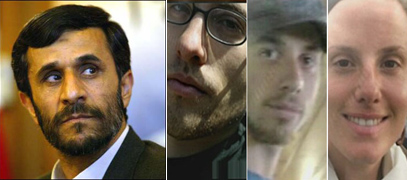The Wall Street Journal, April 3 2010– As the three Americans detained in Iran near the end of their eighth month in captivity, it has become increasingly clear that their case, like those of so many other prisoners in Iran, is not legal but political and a matter of human rights.
Since Sarah Shourd, 31, Shane Bauer, 27, and Josh Fattal, 27, were arrested by Iranian authorities who claimed they illegally crossed the border from neighboring Iraq last July, the three Americans have been almost completely cut off from the outside world. Swiss Ambassador Livia Leu Agosti, whose embassy represents U.S. interests in Iran, was able to visit the trio twice, but the last time was in late October. It was not until March 9—more than seven months after their arrests—that the three were permitted to call their families for the first time. The hikers have been held in solitary confinement for a prolonged period. (Sarah still is, her family says, although she is allowed to meet with Josh and Shane at least once a day.) And although Sarah, Shane and Josh have a lawyer, they have not been allowed to meet with him even once, according to their families.
The hikers have been held in solitary confinement for a prolonged period. (Sarah still is, her family says, although she is allowed to meet with Josh and Shane at least once a day.) And although Sarah, Shane and Josh have a lawyer, they have not been allowed to meet with him even once, according to their families.
The families do not believe that the three have been physically tortured. That is good news, but torture is not only physical.
Human-rights activists have a name for the isolation, denial of access to attorneys or family members, and mix of intimidation and manipulation that many detainees endure. They call it “white torture,” which does not leave any physical marks on the body but devastates one’s mind and conscience.
We, too, experienced white torture when we were detained in Iran in recent years and accused of crimes against the Islamic state. During interrogations that lasted for several days, we were usually blindfolded and sat facing a wall, as our interrogators fired questions from behind. We had no legal representation during that time; and we were severed from our families—treatment that an intelligence agent later claimed in one of Ms. Saberi’s trials was “natural” in “security” cases like hers. Our lives were threatened, as were those of our families. Mr. Memarian was beaten.
This kind of treatment is not uncommon for political prisoners in Iran. Human-rights organizations fear that both psychological and physical torture have been inflicted upon many of the thousands of journalists, human-rights campaigners, reformist figures, students and other activists that human-rights advocates say were arrested since last June’s disputed presidential election for having exercised their basic human rights.
Like the hikers, we were held in Evin Prison. Like them, we were not criminals, but our captors did not care about reality. They had a plan for us from the beginning and were determined to implement it. They wanted us to say we had connections to foreign governments and agencies and that our presence and work in Iran were part of a plot to undermine the Islamic regime. Although this was not true, under intense pressures and threats, both of us agreed to “confess” to crimes we had not committed and were promised freedom in return.
It is possible that Sarah, Shane and Josh, whom Iranian authorities have accused of espionage, have been under similar pressures to make false confessions.
While the three Americans might have mistakenly crossed into Iran while hiking near the Iran-Iraq border (though even that is not clear), they are not spies. They are simply young travelers fascinated by the beauty and history of the Middle East, and curious to learn about different cultures in the region.
If Iranian authorities had a single piece of evidence that the trio had taken part in espionage or any wrongdoing other than perhaps crossing the border, they certainly would have revealed it by now.
Moreover, if the judiciary had a substantial case against the three Americans, Iranian President Mahmoud Ahmadinejad would not have suggested a prisoner swap last month—a proposal that makes it seem as if Iranian authorities see the three as hostages (never mind that hostage-taking is a clear violation of international law).
Regardless of what Sarah, Shane and Josh are accused of, the treatment they have been given is not at all justified. Yet it is merely one example of the widespread, entrenched methods used with prisoners in Iran.
As Iran seeks a seat on the United Nations Human Rights Council (UNHRC), the international community must hold Tehran accountable for its violations of human rights. If Iran gets elected to this body by secret ballot of the General Assembly in May, it would make a mockery of the council and be a disaster for its legitimacy.
While the Obama administration seeks allies to pressure Iran over its nuclear program, Washington should also push them to unite in preventing Iran’s membership in the UNHRC and in pressing for a special U.N. rapporteur on human rights to Iran. The U.S. and the West have not yet used all their diplomatic channels to hold Tehran responsible for its notorious human-rights record, which encourages Iran to believe it can get away with recklessly violating the basic rights of both Iranians and foreigners.
Mr. Memarian is an Iranian journalist who was detained for 55 days in 2004 and was the recipient of Human Rights Watch’s highest annual award in 2005. Roxana Saberi was working as a freelance journalist in Iran when she was arrested in January 2009. She was released 100 days later and is now writing and speaking out about prisoners of conscience in Iran. Her book Between Two Worlds tells the story of her arrest and captivity in Iran.
